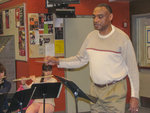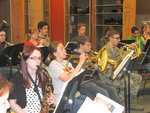

Back in 2012, Battle Ground High School Band Teacher Greg McKelvey started to notice that he was having trouble walking from the band room on the high school campus to the stadium without having shortness of breath.
“At first I thought it was cold related, but it persisted,” McKelvey said. “Then one day I woke up and felt like I couldn’t breathe. I called my regular doctor and he told me to go to the ER. I was still thinking it was cold related, but they ended up keeping me there for like four hours and they ran all these tests and then told me, ‘you have congestive heart failure.’”
After hearing his test results at the ER, McKelvey, who will be 60 this year, met with his regular doctor who referred him to a cardiologist. The cardiologist ran an echocardiogram test and found that he did indeed have congestive heart failure and found some damage that had already been done.
“They put me on a regimen,” McKelvey said. “The first thing I had to do was change my diet. I mean, they basically said you either change your lifestyle or you die. I’ve never had it put to me that way before.”
The one aspect about his new regimen that was the hardest for McKelvey was that he needed to stop working 16-hour days like he had been doing during much of the week.
“The doctors told me I needed to get more rest, that was the biggest thing,” McKelvey said. “I don’t smoke, I’m a real light drinker, the biggest thing they said I needed to do was get more rest and eliminate stress.”
Although teaching is definitely not a stress-free job, McKelvey said when his students found out about his health issues, they actually worked to make things easier on him.
“For example, this was during the beginning of basketball season and the kids decided I didn’t need to be at every basketball game,” McKelvey said. “When I went to basketball games, I wasn’t getting home until 10:30 or 11 at night (because of living in Aloha, OR), and I get up at 4 a.m. everyday to go to work. The kids really stepped it up and made things easier for me, they helped reduce my stress.”
Eventually, McKelvey had an angiogram done and his doctor decided it would be best if he had a defibrillator/pacemaker put in just in case if something were to go wrong with his heart, the device would “kick it back in.” Doctors think that what may have caused McKelvey’s heart condition is the fact that he has severe sleep apnea, a sleep disorder characterized by pauses in breathing or instances of shallow or infrequent breathing during sleep. Like most people who suffer from sleep apnea, McKelvey has to sleep hooked up to a Continuous Positive Airway Pressure (CPAP) machine every night. With the help from the machine, medication and stress reduction, McKelvey said he has been feeling better.
“I still have some shortness of breath occasionally, but I’m able to exercise and do more,” McKelvey said. “At this time last year, I couldn’t play my saxophone without feeling like I was going to faint. Now, I can play it fine, I’ve actually played several concerts at my church recently and have been OK. My doctor said I’m on the right path. They told me 50 percent of people actually get better, 25 percent stay the same. If I stayed the same, that wouldn’t be a bad thing. I’m feeling a lot better, I do get tired if I overwork.”
McKelvey has been a band teacher at Battle Ground High School since 1996, coming to the district after about 14 years at Wilson High School in Portland. He instructs the freshmen band, symphonic band and advanced jazz band at Battle Ground High School, and also instructs jazz band at Chief Umtuch and Tukes Valley middle schools.
McKelvey credits his father, former basketball player Eural McKelvey, as the one who drove him to pick up an interest in music.
“When he (Eural) was in high school, he was an All-American, he was such a great player,” McKelvey said. “I played basketball through high school and I remember, one time specifically, I had played a really good game. Someone came up to me and said, ‘Greg, you did really good.’ I said ‘thank you,’ but then they said, ‘you know when you had the ball in the corner, this is what your dad would’ve done.’”
In the mid 1950s, McKelvey’s father was drafted by the Milwaukee/St. Louis Hawks, starting as a small forward alongside Bob Pettit Jr., the first recipient of the NBA’s Most Valuable Player Award. However, McKelvey said that at the end of the preseason, his father was told he had to be cut from the team because people weren’t “ready for a black ball player.”
After being cut from the Hawks, Eural was picked up by the Harlem Globetrotters and played with them for about five years. He was then drafted into the U.S. Army and when he returned, he joined the Harlem Clowns as a player and coach, which he did for about 25 years. McKelvey’s two brothers, who were both avid basketball players at 6-foot-10 and 6-foot-8, currently own the Harlem Clowns team.
In addition to basketball, McKelvey’s father was also a skilled baseball player and was, at one point, drafted by the St. Louis Cardinals.
“He was just a superior athlete to all of us,” McKelvey said of his dad. “We couldn’t compete with that. At least basketball got us all scholarships.”
McKelvey played basketball at Warner Pacific College in Portland, where he graduated with a degree in music.